Juvenile Case Process
Juvenile court deals with offenses involving children who
are under the age 17 at the time the offense was committed.
Case Process at a Glance
|
In order to familiarize yourself with the criminal justice system, please review
the following sketches, flowcharts and definitions. |
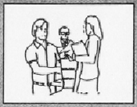 |
5.
Preliminary inquiry or hearing. Court determines to/not authorize
petition |
|
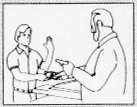 |
1.
Crime is committed. |
|
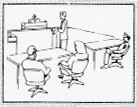 |
6.
Juvenile pre-trial conference pleads guilty or trial is held. |
|
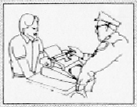 |
2.
Crime is reported to police. |
|
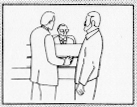 |
7.
Trial, victim/witness may testify.. |
|
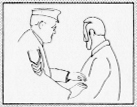 |
3.
Police investigate. |
|
 |
8.
Juvenile disposition hearing. |
|
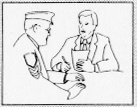 |
4.
Prosecutor evaluates case; petition issued. |
|
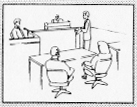 |
9.
Review hearing. |
|
Detailed Description of Case Process
This will briefly explain how a juvenile case is
processed. The juvenile justice system is designed to receive petitions and
dispose of cases involving delinquent activity by persons under
the age of 17. The purpose of the juvenile division of the probate court is
stated as follows:
"This chapter shall be liberally construed to the end that each child coming
within the jurisdiction of the court shall receive such care, guidance, and
control, preferably in his own home, as will be conductive to the child's
welfare and the best interest of the state, and that when such a child is
removed from control of his parents, the court shall secure for him or her care
as nearly as possible equivalent to the care which should have been given to him
or her by them."
- POLICE INVESTIGATION - Upon completion, the police can either:
- Reprimand the juvenile and release them to his or her parents, or
- Seek approval of the county prosecutor to file a petition in juvenile court
charging the juvenile with committing the crime.
- IF PETITION IS FILED - The probate court either:
- Warns the juvenile and dismisses the petition, or
- Sets the case for the formal court calendar.
- IF THE CASE IS SET FOR THE FORMAL COURT CALENDAR -
- There will be a pretrial hearing, a trial by judge or jury, and if the juvenile
is found guilty, then there will be a disposition hearing (sentencing), or
- Under certain circumstances, the probate court can order a 15 or 16 year old
juvenile to stand trial as an adult (waiver).
- IF THE JUVENILE IS KEPT IN THE JUVENILE SYSTEM - The probate
court can:
- Place the juvenile on probation in his or her own home, in a relative's home, or
in a foster home,
- Send the juvenile to an institution for treatment of juvenile offenders, and/or
- Order the juvenile to participate in such programs as counseling, education,
drug or alcohol treatment, pay restitution to the victim, and do community
service work. A juvenile on probation has Review Hearings after 6 months.
Whether they are continued on probation depends upon their conduct and
completion of terms and conditions of probation.
If you choose to attend these hearings, you must notify the clerk or bailiff
when you arrive. If the Prosecutor is appearing at the hearing, you may speak to
him or her before any plea agreement is concluded.
Contact Information
St. Clair County Prosecuting Attorney
201 McMorran Blvd., Suite 3300
Port Huron, MI 48060
|
Photos courtesy of the Port Huron Times Herald and St. Clair County Sheriff's Department


